There was never much of a chance, but Republicans had one final opportunity to take the exit ramp from crazy. But in New Hampshire (once again), it was the road not taken. Via the NYT:
Nikki Haley bravely vowed to soldier on, but she is about to crash into the Trumpian wall in Nevada and her home state of South Carolina where the abbreviated, Potemkin GOP primary season will come to its inevitable pathetic end. Really, it’s already over and has been for months.
The problem, as Will Saletan writes in today’s Bulwark, is simply that the Republican Party has lost its mind. In both Iowa and New Hampshire Haley won among voters “who acknowledge that Trump legitimately lost the 2020 presidential election. The second group, which overlaps with the first, is Republican primary and caucus voters who accept that if Trump were to be convicted of a crime, he would be unfit to serve as president.”
The problem is that there are not nearly enough of those voters left in the Republican Party to put together anything like a winning primary coalition. This is the 2024 reality check. Writes Saletan:
[Most] Republican voters simply love Trump, and therefore they’re willing to say that he was the real winner in 2020 or that he’d be fit to serve again despite a criminal conviction. But that’s just another way of conceding their pathology. Sensible people don’t let sympathy for a politician drive them to such recklessness.
The derangement doesn’t stop at election denial. It extends to violence. The clearest illustration comes from a poll of likely New Hampshire Republican primary voters, taken by YouGov and UMass Lowell’s Center for Public Opinion from January 6 to 16. The poll asked respondents whether they supported or opposed “full pardons for all Americans arrested for their participation in the riot at the U.S. Capitol on January 6, 2021.” According to the center’s director of survey research, John Cluverius, Haley led Trump by 55 to 29 percent among respondents who opposed such pardons. But Trump led Haley by 65 to 18 percent among respondents who supported the pardons.
Haley’s problem, mathematically, was that 58 percent of the poll’s respondents supported the pardons. Only 42 percent opposed the pardons. She was dealing with an electorate that favored pardons for the January 6th arrestees and therefore, on balance, favored Trump. She needed saner people to show up on Tuesday. And not nearly enough of them did.
So even though the shouting will continue a bit longer, today marks decisively the pivot from the primaries to the general election. As Mona Charen and I discussed yesterday, the next few weeks will be Trump’s high-water mark, as he triumphantly struts amid the ruins of his GOP opposition and reasserts his imperium.
But watch how quickly the vibe now shifts.
For months, the punditocracy has focused on the obdurate post-indictment loyalty of the MAGA base, the GOP’s enthusiastic embrace of the culture wars, and the party’s race to the right. This has been bookended with (often quite justified) pearl-clutching over Joe Biden’s weakness and the incumbent’s many vulnerabilities.
Now that the primary is over, however, attention will be paid to something else: Donald Trump, who has throttled opposition in the minority party he heads, has a much more serious problem with the voters who will decide the actual election in November.
The evidence was there in Iowa, and again in New Hampshire. As Dave Wasserman noted last night: “New Hampshire is politically unique in many ways, but it's off the charts in terms of its share of independent voters who don't like Trump.”
New Hampshire is not alone. As Politico noted this week:
There’s a whole swath of the Republican electorate and a good chunk of independents who appear firmly committed to not voting for him in November if he becomes the nominee.
It’s an issue that became starkly apparent in polling ahead of the Iowa caucuses, when an NBC News/Des Moines Register/Mediacom poll of voters in that state found that fully 43 percent of Nikki Haley supporters said they would back President Joe Biden over Trump. And it’s a dynamic that has been on vivid display as the campaign shifted this week to New Hampshire.
There may not be enough of these Never Trump voters to determine the outcome of a Republican primary; but there may be more than enough to sway the outcome of the general election, especially in the key swing states. Even as Trump rolled to victory last night, noted Reuters, that weakness with moderates and independents was on vivid display.
Some 35% of voters in New Hampshire's contest considered themselves moderates or liberals - the kind of voter who will be critical in November's general election. Only one in five of these voters picked Trump, with about three quarters voting for Haley, according to the exit poll results which were still being updated….
There were other warning signs as well. Nearly half (47%) of GOP primary voters said that Trump would not be fit to serve as president if he was convicted of a crime. Fully 84% of Haley voters said a criminal conviction would be disqualifying. And a Fox News (!) analysis of 1,800 GOP primary voters found that more than a third of them would never (ever) vote for Trump.
Exit polls also reminded us that MAGA is a minority within a minority.
Nearly two-thirds (64%) of New Hampshire Republican primary voters said they do not consider themselves part of Trump's "MAGA" movement, according to early NBC News exit poll results.
For the moment at least, Trump is making little effort to win back any of the voters he has alienated over the last eight years. As he begins the long march through the criminal justice system, it’s difficult to see how that would work. If anything, his rhetoric has gotten more extreme, even as his cognitive decompensation is accelerating.
And, of course, Trump was typically ungracious in victory, with a thinly veiled threat to smear his rival if she didn’t bend the knee quickly. Via the Independent:
The former president appeared to threaten his former UN ambassador after she vowed to continue her fight for the 2024 GOP presidential nomination.
“Just a little note to Nikki, she is not going to win, but if she did she would be under investigation by those people in 15 minutes. I could tell you five reasons why already, not big reasons, little stuff that she doesn’t want to talk about, but she will be under investigation in minutes.”
Subtle it was not.
**
Speaking of vibe shifts
We may no longer live in a political world dominated by “the economy, stupid.” But the economic numbers are also improving at precisely the moment Biden needs them. That lead the Wapo’s Catherine Rampell to write “Why the 2024 campaign could start looking more like 2012.”
Until now, she notes there has been a disconnect between the relatively robust economic numbers and the more pessimistic consumer sentiment, which was reflected in dire polls for the incumbent. But lately, writes Rampell, “those vibes have shifted. Optimism is busting out all over the country.”
Since November, for instance, the University of Michigan’s long-running consumer sentiment index has risen a cumulative 29 percent. That’s the largest two-month increase since 1991, leaving sentiment at its highest level since mid-2021.
Other data suggest the same thing.
A similar consumer confidence measure from the Conference Board, a corporate think tank, also ticked up. And surveys from YouGov and the Economist find that the share of Americans who believe the economy is in recession has been shrinking.
Notes Rampell: “These are all terrific developments for Biden’s reelection campaign. Though it seems unlikely that the economy will suddenly transition into a winning issue for the incumbent, it might stop being an albatross around his neck.”
And she reminds us about the vibes surrounding Barack Obama’s 2012 re-election.
One possible scenario for the 2024 presidential election is a trajectory that looks a lot like 2012’s. During that campaign cycle, negative views of the economy weighed heavily on President Barack Obama’s job approval. A year ahead of the election, Obama was trailing his likely Republican challengers across a dozen swing states, and his chances for reelection were considered relatively weak. But economic conditions gradually improved, as did voters’ views of the economy. By the time November rolled around, Obama won handily.
**
Meanwhile: “New Pennsylvania poll shows Biden leading Trump in head-to-head” - pennlive.com
Happy Wednesday.
Michael Kruse: Trump's Grand Finale
On Tuesday’s podcast: As a longtime legal combatant, probably no one else on earth is more prepared to leverage four prosecutions than Donald Trump—he’s made an art form of attacking the courts, our justice system, and the rule of law for 50-plus years. Plus: an amazing profile of a New Hampshire Trump supporter. Politico’s Michael Kruse joins me.
You can listen to the whole thing here. Read Kruse’s pieces here and here. Or watch us on YouTube.
Quick Hits
Elise Stefanik’s Deranged Defense of Trump Offers Democrats a Lesson
Greg Sargent in The New Republic:
The struggle of Stefanik and other Republicans to address Trump’s legal problems illustrates another rationale for Democrats pressing the issue: It could put GOP downballot candidates on defense too. “Democrats would benefit from having Republicans on record in regards to Trump’s deep ethical and legal troubles,” said one senior Democratic strategist involved in congressional races. Confirming the point, when Stefanik recently described the people who attacked the Capitol as “hostages,” vulnerable House Republicans rapidly distanced themselves from the remark.
Even Republican Senator John Thune admits he’s “worried” about Trump’s appeal in the “middle of the electorate,” pointedly noting that this could hurt Republicans downballot. A Washington Post poll finds that large majorities of independents view the prosecutions of Trump as legitimate under the law. And as Ron Brownstein details, a fair amount of data shows that a small but nontrivial swath of educated, moderate Republican voters remain concerned about Trump’s assaults on democracy and alleged crimes. So Thune’s fear seems reasonable.
2. Biden's media problem
Smart take by Matthew Yglesias in a recent Slow Boring newsletter:
The people who make (and, to a lesser extent, the people who consume) journalism are very interested in the student loan issue and not as interested in the Medicare stuff. But the voters care a lot about Medicare, and if they viewed the 2024 election as a referendum on Joe Biden’s approach to Medicare versus Trump’s promise to repeal these planks, that would be a huge boost to Biden.
Unfortunately for the president, his actual Medicare policies have played essentially no role in the public’s understanding of contemporary politics.


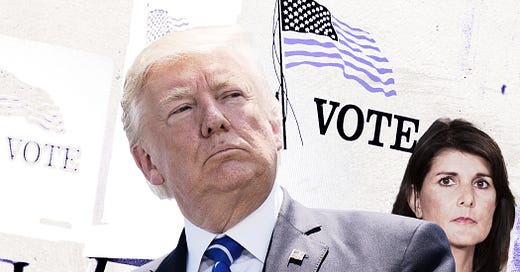



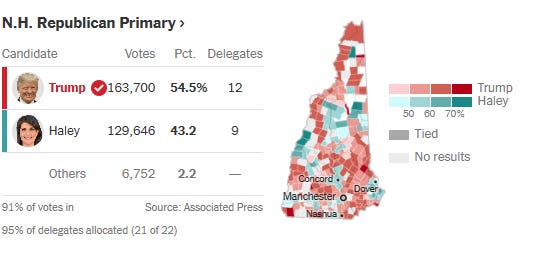
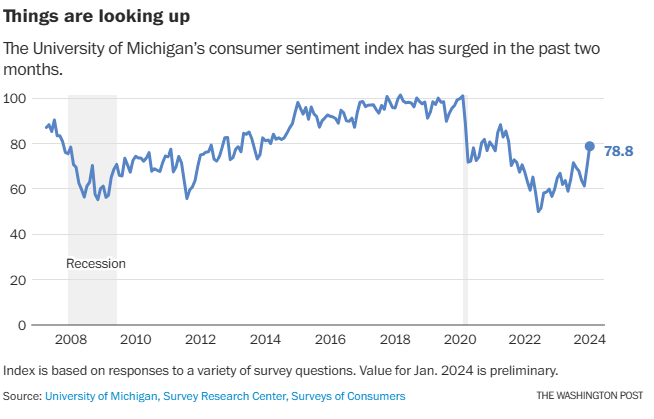

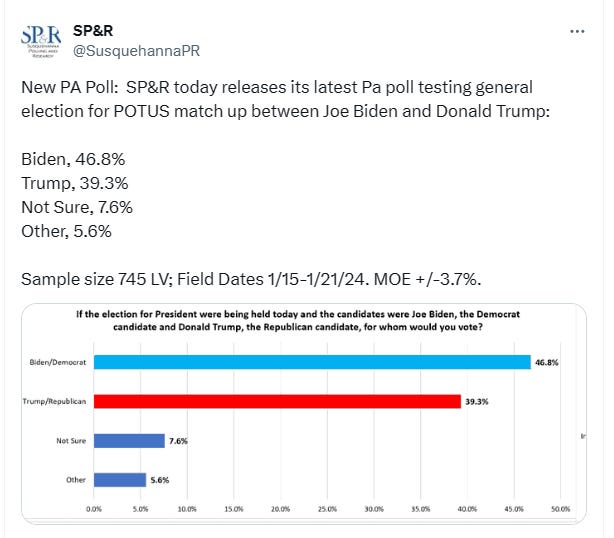

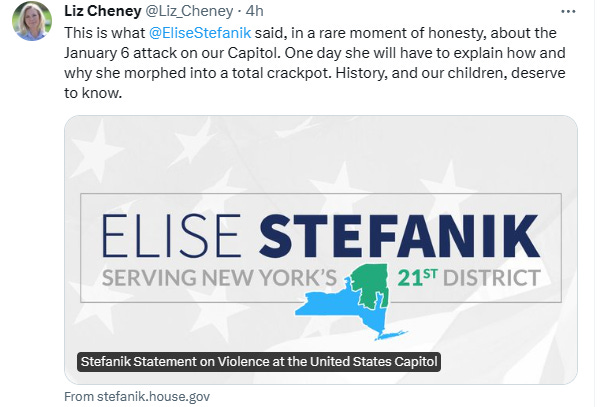
People who say Biden did not win in 2020, that the election was stolen, have no business voting; or, for that matter, serving on juries. They have lost the ability to reason. People who know Trump lost, but say the election was rigged anyway, aid and abet a crime.
Call me cynical if you like, but having seen the GOP takeover coming so long ago, I'm less concerned about reading and writing postmortems on the party at this point and am more in the mode of formulating a Plan B, a personal exit plan, if things go badly in November. Fortunately I have viable options, unlike a lot of other people. I just wish that, like so many others, I weren't in the position of having to consider that extreme option in the first place. It all seems like a bad dream, and then so much more.
I really do not want to spend the rest of my life wondering how it all came to this and telling people why I left America for greener pastures, turning my back on my homeland and leaving it behind when I had been perfectly happy and productive there, only to watch the nation gradually embrace its worst characteristics and for the worst of reasons. It all feels so unreal and seems so unthinkable. And I certainly can't promote America as being the Greatest Nation on Earth if so many of its good people feel like they are unsafe there, and if all that they worked to build up might be taken away in the end. Our forefathers must be looking at us with substantial sadness from the Great Beyond.